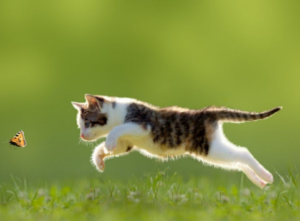For cats, play is mostly a predatory behavior. It’s about hunting the mouse, killing it and then eating it. So as you read on, whenever you see me use the word “hunt” below, insert the word “play” instead..

Unlike animals like cows and sheep that are “grazers” and need to eat all day long so they don’t starve, Cats are predators so they eat and save calories in a different way.
They engage in what is called the cycle of predation during which they hunt, kill and then eat. Once they eat, nature has developed a way for them to conserve calories so they don’t starve. They sleep. Their switch gets turned from “on” to “off”. Sometimes we try to turn cats into grazers by free feeding them (leaving the bowl of crunchies out). While that isn’t wrong, it’s not in synch with their natural approach to food, activity and rest. Even if we feed them scheduled meals, typically wet food, it may be one or two hunting expeditions short of what we want. When we typically just set the food down and walk away we may not be making them hunt for their food.W hile many people think of cats as nocturnal, what they really are is crepuscular, which means most active at dusk and DAWN!
So what your cat is doing is partly learned behavior and partly natural. Cats, like people, engage in something we call the slot machine effect (technically the “irregular schedule of reward”). Casinos know this effect well. When a reward is random, people (and animals) will repeatedly engage in behaviors designed to elicit the reward. They will do this until they get the reward, feeling like it is just around the corner. So if she picks on you, to a degree it is about her not knowing when the reward is coming and being persistent about trying to get it.
 The trick to fixing this particular behavior is neither rewarding it, nor trying to discourage it at the time it’s happening, but instead to reschedule her in a way that satisfies her needs.
The trick to fixing this particular behavior is neither rewarding it, nor trying to discourage it at the time it’s happening, but instead to reschedule her in a way that satisfies her needs.
Presumably when she wakes you up, you either ignore her as best as possible, or give in, or first the former and then the latter. The end result is she either gets what she wants (while waking you up), or is left unsatisfied – and you’re still woken up! So the optimum way to “re-program” our cat is to prevent her from waking you up in the first place. And the best way to do this is to give her the full cycle of predation about an hour before your bedtime. With the domestication of these great hunters the bottom line is we’ve generally brought them inside, taken away most of their hunting options and wonder why they get the nighttime crazies! If her behavior isn’t “late night oriented” but is about randomly attacking you during the day, then we have to re-program her hunting instincts away from you towards toys and re-associate play/hunting with feeding.
We can’t re-train our cats by thinking about the issue, or even by talking about the issue.
If we want to see results we actually have to engage in training and behavioral experiments. This means doing a certain amount of work. So I encourage you to do the work and help your cat be the happiest she can be, and build the bond possible between you and her. Generally speaking, a happy cat has happy humans. If one of them isn’t happy, it’s likely the other isn’t either, , or someone is getting their needs met at the other’s expense!
So how do I teach my cat a new way of thinking and acting?
A complete and customized behavior modification plan can make significant progress to the point of real success with either type of cat described above. I will help you do this as part of our work together.
Also please see this short companion doc Cats and Their Place on the Scale of Predation vs. Prey: https://bit.ly/CatsAndTheScaleOfPredationAndPrey

By Stephen Quandt
Copyright © Stephen Quandt, 2023, All Rights Reserved | Email: [email protected] | Instagram: @CatBehaviorHelp
